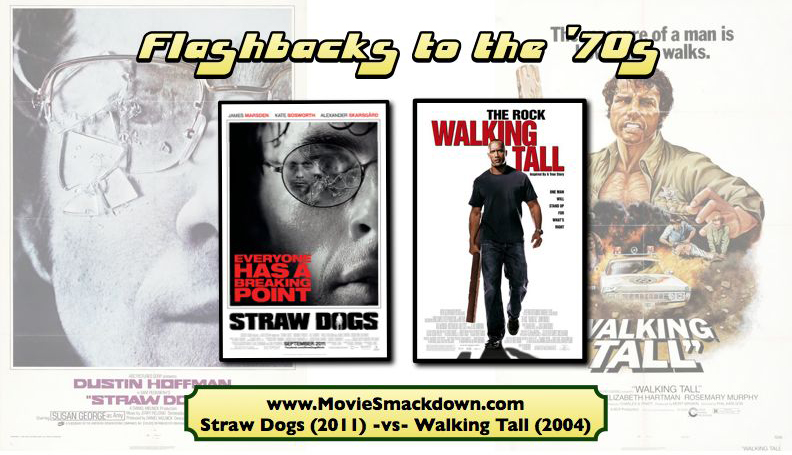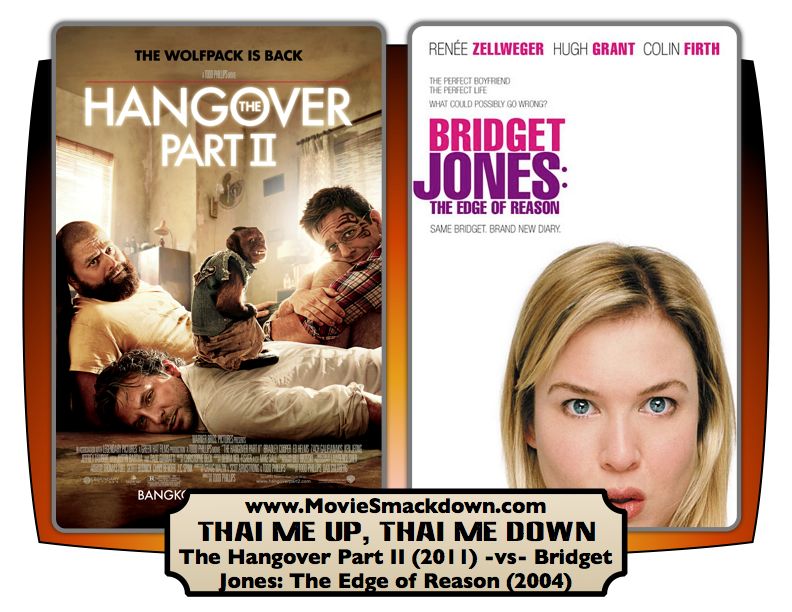
 The Smackdown
The Smackdown
The gloomy 1970s were a good time for dark, bloody, man-against-tall-odds dramas. Two of the more successful movies in this genre were Phil Karlson’s cult classic Walking Tall and Sam Peckinpah’s controversial (at the time, anyway) Straw Dogs. Now that we live in the Age of the Remake, over the last few years we’ve inevitably gotten shiny new versions of both.
The two films feature loner protagonists, overmatched against hostile forces much better equipped to prevail in a fight. In the case of Walking Tall, Iraqi war vet Chris Vaughn (Dwayne Johnson, or “The Rock†to fans of his pro wrestling career) squares off against an evil casino owner and the minions he’s been able to corrupt with his money. Meanwhile, nerdy Straw Dogs protagonist David Sumner (James Marsden) has to contend with a pack of violent rednecks including both Alexander Skarsgard (Zoolander, TV’s True Blood) and the ever-volatile James Woods, either of whom would be a scary opponent all by himself.
True to their nature, our two contenders will have to fight this Smackdown pretty much alone. In the case of Walking Tall, everyone else in the arena is either an accomplice for the bad guys or a helpless onlooker. In Straw Dogs, Amy offers assistance to David, but their relationship by then is so frayed, we view the final standoff as his last-ditch chance to overcome her contempt.
[singlepic id=1219 w=320 h=240 float=right]
The Challenger
Our hero in Straw Dogs is decidedly un-heroic. David’s a Hollywood screenwriter, which even back in civilization makes him an outsider; here in the sticks, things are decidedly less civil. His first bad decision is to move to the childhood hick hometown of his hot actress wife Amy (Kate Bosworth) in order to write his latest project and rehabilitate her childhood home after her father’s death. His second is to hire her ex-boyfriend Charlie (Skarsgard), now a contractor, to build a new roof for the barn at their adopted home. (What, there were no other local work crews available?)
The relationship between David and Charlie’s gang rapidly deteriorates, helped in no small measure by Amy’s overtly sexual public behavior. The disdain the locals hold for her uppity, Ivy League-turned-Hollywood husband is palpable in the way they come into the house uninvited and have their way with the refrigerator and eventually the household pet. Despite this, Bad Decision No. 23 — David agrees to accompany the gang on a dubious deer hunting expedition. Once out in the woods, David takes a step toward proving his manhood to himself, while at the same time, Lurie cross-cuts to show us how deeply clueless he really is.
Once it’s too late, David finally does the sensible thing and fires Charlie’s crew. They don’t take kindly to this, and matters escalate further when the Sumners provide sanctuary for Jeremy (Dominic Purcell), a mentally challenged man suspected in the disappearance of the daughter of the local retired football coach (Woods, unhinged as usual). Charlie’s crew and the psycho coach lay siege to the Sumner home, and in a gripping and grueling adult-version of Home Alone, David is forced to man up and defend himself.
[singlepic id=1220 w=320 h=240 float=right]
The Defending Champion
The odds are slightly more even in Walking Tall. Main character Chris, after all, is a Special Forces operative freshly returned from Iraq. What he comes home to is a town seemingly taken over by his ex-schoolmate, the rich and slimy Jay Hamilton (Neal McDonough). Through his money-leeching casino operation, Hamilton pays off local officials including the ineffectual sheriff. As if the casino weren’t enough of a cash factory, our energetic villain also cooks and sells hard drugs to local teens like Chris’ nephew.
One night, Chris’ old friends take him for a night at the casino, during which he notices that the house actively cheats its customers by using loaded dice in their craps games. This leads to an argument, which leads to a brawl, which leads to our hero’s arrest. But under the surface, everyone knows Jay is a criminal and his operation a fraud, and as a result, Chris wins acquittal. He then campaigns successfully to replace the incumbent sheriff in a looming election.
Now that he’s the town’s chief lawman, everyone can certainly smell what The Rock is cookin’, and on the burner is a big heaping skillet of revenge. He arrests one of Jay’s henchmen, and the rest (including the deposed incumbent sheriff) come after him. You can’t put the big man down that easily, of course, and Chris takes care of them, then hunts down The Boss to put an end to his criminal reign.
The Scorecard
Both movies are fairly unnecessary remakes of films that either didn’t require updating (Straw Dogs) or weren’t all that distinguished to begin with (Walking Tall). Just as the original Peckinpah film had infinitely more complexity and ambiguity than Walking Tall, the remakes take different paths as well. Straw Dogs 2011 is played straight to deliver a grim, tense story; its rival is more tongue-in-cheek, never quite taking its legacy too seriously and being almost flip and cartoonish in the way it depicts violence. What helps is that Johnson has charm and as a result is inherently likable. Although we don’t quite believe this ex-soldier is ever in mortal danger, it’s fun to watch him do his thing and take care of the bad guys.
David in Straw Dogs lacks that charm. In fact, what hurts the movie is that there really isn’t much to like about him at all. His decisions are consistently bad, he has no clue how to handle people or situations (an odd characteristic for a successful writer), and he’s insensitive to his wife. In the original, he was played by Dustin Hoffman, an actor who has a natural underdog quality. Marsden’s David lacks that advantage, so we don’t really root for him to beat the rednecks, and the story isn’t as compelling as it should be.
Another minus for the movie is its depiction of the bad guys. Some attempt is made to provide dimension to Charlie, who seems trapped by jealousy and circumstance and shows some regret for the terrible things he does. But the rest of his crew is a stereotypical gang of gun-totin’, booze-swillin’ rednecks, complete with Confederate flag bumper sticker and yee-haw! dialogue. When Lynyrd Skynyrd and Molly Hatchet start pumping from their boom box, you roll your eyes at the inevitable and wish screenwriter-director Rod Lurie had been more inventive in crafting his supporting characters.
The Decision
Walking Tall 2.0, directed by Kevin Bray and written by David Klass, Channing Gibson and David Levien & Brian Koppelman, is an enjoyable diversion, a crisply paced, no-frills action movie with a hero who’s easy to root for. It knows its audience and how to deliver what it offers; despite the film’s modest budget, there are some good action set pieces, including a noisy shoot-’em-up at the sheriff’s headquarters. Surprisingly for a movie of this type, the violence is actually depicted with restraint, and there isn’t all that much blood n’ guts. This helps the film effectively maintain its tone, which is lighter and frothier than typical low-budget action offerings.
The set pieces in Straw Dogs are also loud and violent, but they’re not played for fun. Unfortunately, they don’t stir many other emotions either. The movie seems to be reaching for profound things to say about the nature of heroism and the effects of violence, but doesn’t quite get there. Instead it opts for the safe, the predictable and the inevitable. Given its raw and brutal story, Straw Dogs should leave some kind of impression, but the only one imparted is that the filmmakers should have tried harder.
Neither of these movies will go down in cinema history, but at least Walking Tall is more successful at what it’s trying to achieve. For that reason, it’s the single combatant standing alone in victory for this Smackdown.




Leave a Reply